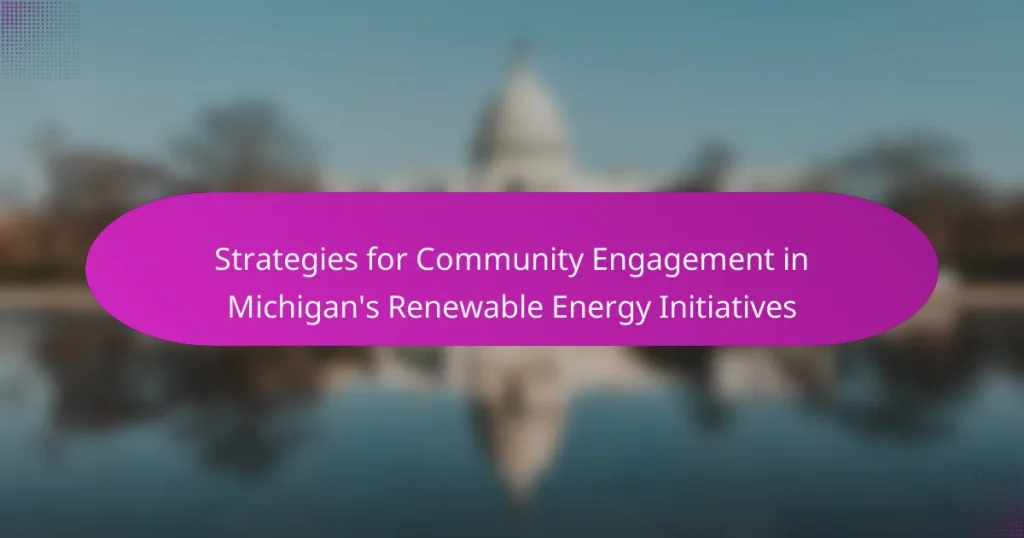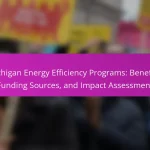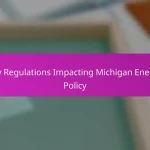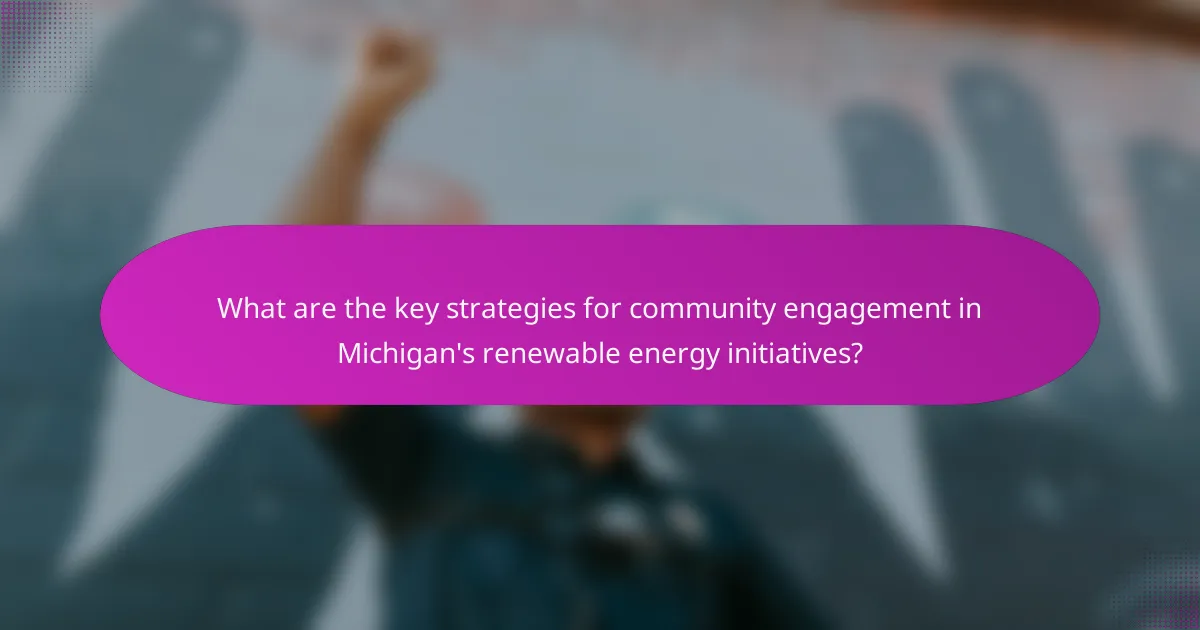
What are the key strategies for community engagement in Michigan’s renewable energy initiatives?
Key strategies for community engagement in Michigan’s renewable energy initiatives include fostering partnerships, increasing awareness, and promoting participatory planning. Fostering partnerships with local organizations enhances trust and collaboration. Increasing awareness through educational programs informs residents about renewable energy benefits. Promoting participatory planning encourages community input in project development. According to the Michigan Public Service Commission, effective engagement leads to higher project acceptance and support. Community workshops and informational sessions have been shown to improve public understanding and involvement.
How do these strategies foster collaboration among stakeholders?
These strategies foster collaboration among stakeholders by creating inclusive platforms for dialogue. They encourage participation from diverse community members, including residents, businesses, and local organizations. Regular meetings and workshops facilitate open communication. This transparency builds trust among stakeholders. Collaborative decision-making processes ensure that all voices are heard. Research shows that inclusive engagement increases stakeholder investment in initiatives. For example, Michigan’s renewable energy programs have seen enhanced cooperation due to community feedback mechanisms. Such strategies lead to shared ownership of projects and better alignment of goals.
What roles do local governments play in these strategies?
Local governments play a crucial role in strategies for community engagement in Michigan’s renewable energy initiatives. They facilitate communication between stakeholders, including residents, businesses, and energy providers. Local governments often create policies that support renewable energy projects. They also provide funding and resources for community education programs. Additionally, they help coordinate public meetings to gather community input. Local governments can implement zoning regulations that promote renewable energy installations. They may also collaborate with state agencies to align local strategies with broader energy goals. In Michigan, local governments have been pivotal in fostering community trust and involvement in renewable energy initiatives.
How can community organizations contribute to engagement efforts?
Community organizations can enhance engagement efforts by fostering local relationships and building trust. They often serve as bridges between stakeholders and communities. This connection promotes open dialogue about renewable energy initiatives. Additionally, these organizations can mobilize volunteers for outreach activities. They can host informational workshops and community meetings to educate residents. Engaging local leaders can amplify the message and encourage participation. Studies show that grassroots involvement increases public support for renewable energy projects. For example, community-led initiatives in Michigan have successfully raised awareness and participation rates.
What challenges do communities face in engaging with renewable energy initiatives?
Communities face several challenges in engaging with renewable energy initiatives. These challenges include lack of awareness and understanding of renewable energy benefits. Many community members may not be informed about the potential savings and environmental advantages. Financial constraints also play a significant role. Limited budgets can hinder investment in renewable technologies. Additionally, there may be resistance to change from traditional energy sources. This resistance can stem from cultural or historical preferences for established energy systems. Technical barriers also exist, such as insufficient infrastructure to support renewable energy projects. Lastly, regulatory hurdles can complicate the implementation of initiatives. Local policies may not align with renewable energy goals, creating further obstacles for communities.
How can these challenges be addressed effectively?
Challenges in community engagement for Michigan’s renewable energy initiatives can be addressed through targeted communication strategies. These strategies include providing clear information about benefits and impacts of renewable energy. Engaging local leaders fosters trust and encourages community participation. Utilizing social media platforms enhances outreach and accessibility of information. Organizing community forums allows for open dialogue and feedback. Collaborating with local organizations can amplify efforts and resources. Educational programs can increase awareness and understanding of renewable energy. These approaches have been shown to improve community involvement and support for renewable projects in various studies.
What resources are available to support community engagement?
Resources available to support community engagement include grants, training programs, and online platforms. Grants can provide funding for community-driven projects. Training programs educate stakeholders on effective engagement strategies. Online platforms facilitate communication and collaboration among community members. Local government websites often list available resources. Nonprofit organizations also offer support and guidance. Research shows that engaged communities have better outcomes in renewable energy initiatives. For instance, the Michigan Energy Office provides resources specifically for community engagement in energy projects.
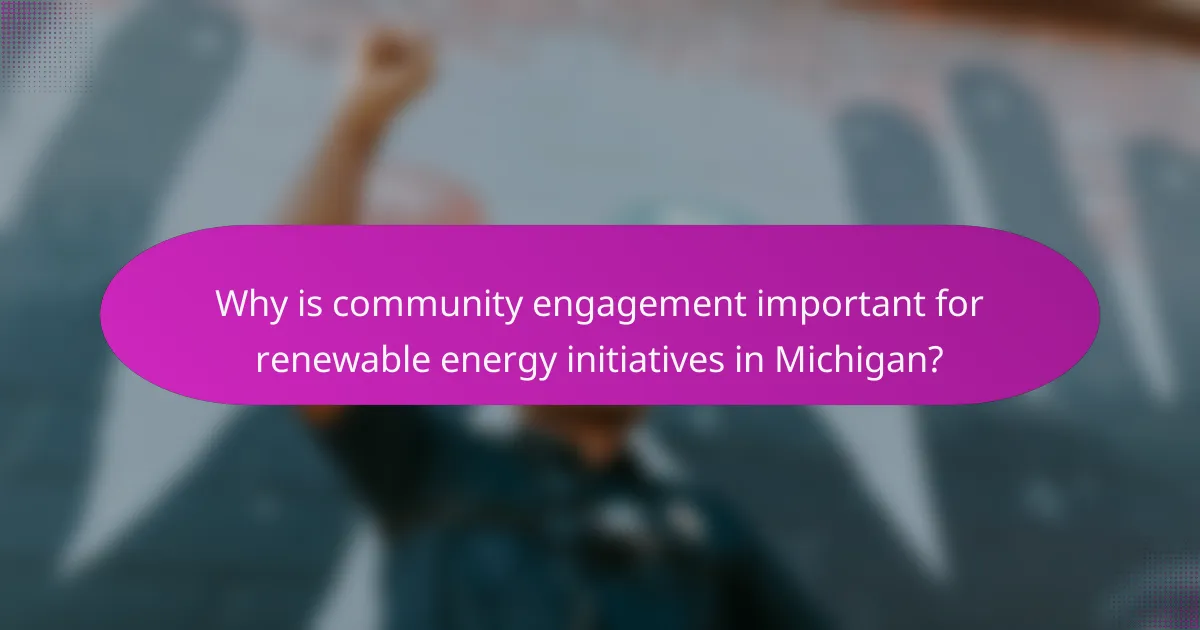
Why is community engagement important for renewable energy initiatives in Michigan?
Community engagement is vital for renewable energy initiatives in Michigan. It fosters local support for projects. Engaged communities are more likely to accept renewable energy developments. This acceptance reduces opposition and facilitates smoother project implementation. Community involvement also helps identify local needs and priorities. Tailoring initiatives to these needs increases their effectiveness. Additionally, engaged citizens can provide valuable insights and feedback. This feedback can improve project design and outcomes. Studies show that projects with strong community support are more successful in achieving their goals.
How does community involvement impact project success?
Community involvement significantly enhances project success. Engaging local stakeholders fosters trust and collaboration. It ensures that projects align with community needs and values. Projects with robust community support often experience higher participation rates. According to a study by the National Renewable Energy Laboratory, community engagement can improve project acceptance by up to 80%. This acceptance leads to smoother implementation and fewer conflicts. Additionally, community involvement can provide valuable insights and resources. Ultimately, active participation contributes to the sustainability and longevity of renewable energy initiatives.
What are the benefits of local support for renewable energy projects?
Local support for renewable energy projects enhances project success and community benefits. It fosters community buy-in, leading to smoother project implementation. Local support often results in increased job creation, as projects typically hire local labor. Economic benefits include increased local revenue through property taxes and business opportunities. Community involvement can lead to improved project designs that meet local needs. Strong local support can reduce opposition and streamline regulatory processes. Studies show that projects with local backing are more likely to be completed on time and within budget. Overall, local support is crucial for the sustainability and acceptance of renewable energy initiatives.
How can community feedback shape renewable energy policies?
Community feedback can significantly shape renewable energy policies by ensuring that policies align with public needs and preferences. Engaging communities allows policymakers to gather insights on local energy concerns. This feedback can identify specific renewable energy solutions that communities prefer. For instance, surveys and public forums can reveal support for solar or wind projects. Incorporating this feedback can enhance public trust and acceptance of policies. Research indicates that community-supported projects often experience higher success rates. The National Renewable Energy Laboratory found that local involvement increases the likelihood of project completion. Thus, community feedback serves as a crucial tool for developing effective and widely accepted renewable energy policies.
What are the best practices for effective community engagement?
Best practices for effective community engagement include building trust, fostering open communication, and ensuring inclusivity. Trust is established through transparency and consistent follow-up. Open communication involves actively listening to community concerns and providing timely updates. Inclusivity ensures diverse voices are heard, allowing for varied perspectives. Utilizing surveys and feedback sessions can enhance participation. Additionally, collaborating with local leaders can strengthen community ties. Research shows that communities engaged in decision-making processes are more likely to support initiatives. For instance, a study by the International Association for Public Participation emphasizes the importance of stakeholder involvement in successful projects.
How can communication strategies enhance community participation?
Communication strategies can enhance community participation by fostering transparency and trust. Effective communication ensures that community members are informed about initiatives and their implications. This can lead to increased awareness and interest in participation. For instance, regular updates through newsletters or community meetings can engage residents. Studies show that communities with clear communication channels have higher participation rates. According to a report by the Michigan Energy Office, transparent communication can boost involvement in renewable energy projects by up to 30%. Engaging stakeholders through social media platforms also encourages dialogue and feedback. This two-way communication builds a sense of ownership among community members. Ultimately, effective communication strategies create a more informed and active community.
What methods can be used to educate communities about renewable energy?
Workshops and seminars can be effective methods to educate communities about renewable energy. These events provide interactive learning experiences. They enable participants to ask questions and engage directly with experts. Informational brochures and flyers can also disseminate key information. These materials can be distributed in community centers and local events. School programs can introduce renewable energy concepts to younger audiences. Integrating renewable energy topics into existing curricula can enhance understanding. Online resources and webinars offer accessible education for broader audiences. They can reach individuals who may not attend in-person events. Community solar projects can serve as practical demonstrations. They allow residents to see renewable energy in action. Local partnerships with environmental organizations can amplify educational efforts. These collaborations can leverage resources and expertise.
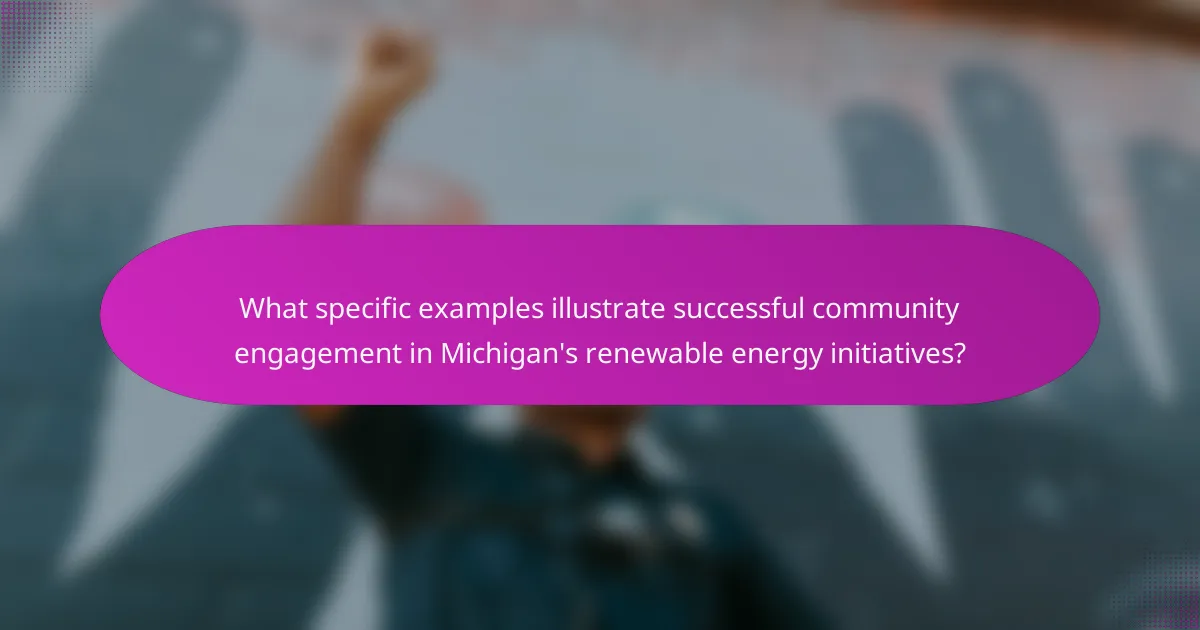
What specific examples illustrate successful community engagement in Michigan’s renewable energy initiatives?
The Michigan Renewable Energy Program illustrates successful community engagement through initiatives like the Solarize Michigan campaign. This program encourages local communities to invest in solar energy collectively. It has led to significant cost savings for participants. Another example is the Michigan Energy Options, which engages communities in energy efficiency projects. This initiative involves workshops and educational programs that empower residents to implement energy-saving measures. Additionally, the City of Grand Rapids has hosted community forums to discuss renewable energy policies. These forums allow residents to voice their opinions and influence local energy strategies. Each of these examples demonstrates effective collaboration between communities and renewable energy initiatives in Michigan.
How have local projects successfully engaged residents?
Local projects have successfully engaged residents by fostering collaboration and participation. These projects often involve community meetings to gather input and feedback. Residents are invited to share their ideas and concerns, creating a sense of ownership. Educational workshops are organized to inform residents about renewable energy benefits. This approach increases awareness and builds trust in the initiatives. Surveys and polls are frequently used to gauge community interests and priorities. Additionally, partnerships with local organizations enhance outreach efforts. For example, the Michigan Energy Office reported that community-led initiatives saw a 30% increase in resident participation compared to top-down approaches.
What lessons can be learned from these successful initiatives?
Successful initiatives in Michigan’s renewable energy sector demonstrate the importance of community involvement. Engaging local stakeholders fosters trust and collaboration. Effective communication strategies enhance public understanding of renewable energy benefits. Tailored outreach programs address specific community needs and concerns. Data-driven decision-making ensures initiatives align with community values. Long-term partnerships with local organizations amplify outreach efforts. Transparency in processes builds credibility and support. These lessons highlight the necessity of inclusive approaches for sustainable energy development.
How can these examples be replicated in other communities?
To replicate these examples in other communities, stakeholders must prioritize local engagement. This involves forming partnerships with community organizations and local leaders. Regular public forums should be held to discuss renewable energy initiatives. These forums can gather input and address concerns from residents. Education programs about renewable energy can raise awareness and interest. Tailoring initiatives to reflect local values and needs is crucial. Data from successful Michigan projects can provide a proven framework. For instance, the Michigan Energy Office reports increased community participation in areas with robust engagement strategies.
What tips can communities use to enhance their engagement efforts?
Communities can enhance their engagement efforts by implementing targeted communication strategies. Utilizing social media platforms effectively can reach a broader audience. Hosting regular community meetings fosters open dialogue and encourages participation. Providing educational resources about renewable energy initiatives increases awareness and interest. Collaborating with local organizations can strengthen community ties and amplify messages. Encouraging feedback through surveys or suggestion boxes helps in understanding community needs. Highlighting success stories from renewable energy projects can inspire involvement. Lastly, offering incentives for participation can motivate residents to engage more actively.
How can communities build trust with stakeholders in renewable energy initiatives?
Communities can build trust with stakeholders in renewable energy initiatives through transparent communication. Regularly sharing project updates fosters openness. Engaging stakeholders in decision-making builds a sense of ownership. Providing educational resources helps stakeholders understand the benefits of renewable energy. Actively seeking feedback shows that community input is valued. Establishing partnerships with local organizations enhances credibility. Hosting community meetings allows for direct interaction and relationship building. Research indicates that trust increases when stakeholders feel heard and involved in the process.
What tools and platforms can facilitate better community engagement?
Social media platforms like Facebook and Twitter can facilitate better community engagement. These platforms allow for real-time communication and feedback. They enable organizations to share updates and gather community input easily. Online forums and discussion boards also provide spaces for deeper conversations. Tools like SurveyMonkey and Google Forms can collect structured feedback from community members. Video conferencing tools such as Zoom foster direct interaction and engagement. Community engagement software like Mobilize helps manage events and discussions effectively. According to a report by the Pew Research Center, 69% of adults in the U.S. use social media, highlighting its potential for outreach.
The main entity of the article is community engagement in Michigan’s renewable energy initiatives. The article outlines key strategies for effective engagement, including fostering partnerships, increasing awareness, and promoting participatory planning, which enhance collaboration among stakeholders. It discusses the roles of local governments and community organizations in these efforts, as well as the challenges faced by communities and methods to address them. Additionally, it highlights the importance of community feedback in shaping renewable energy policies and shares successful examples of local engagement initiatives in Michigan.
